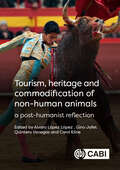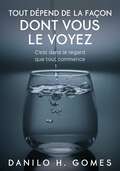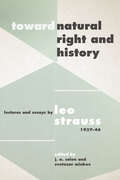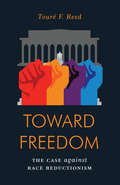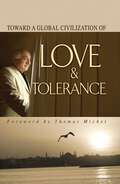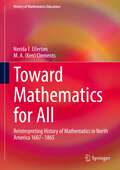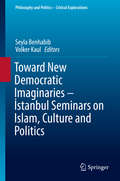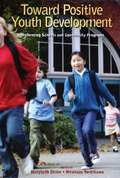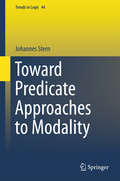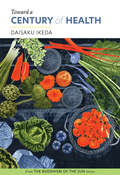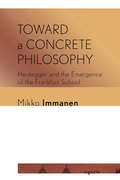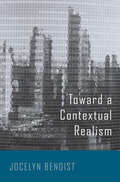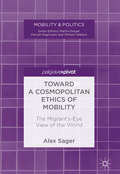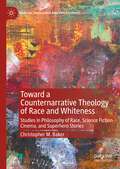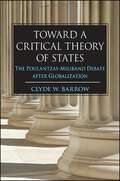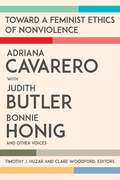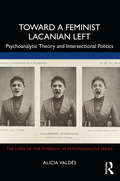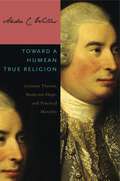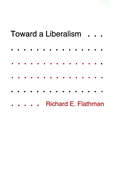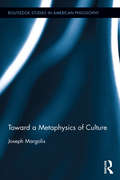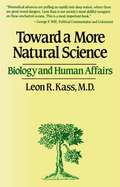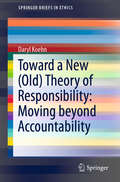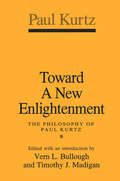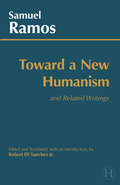- Table View
- List View
Tourism, Heritage and Commodification of Non-human Animals: A Posthumanist Reflection
by Alejandro Morales Carolin Funck Gustavo Ortiz-Millán Johan Edelheim Bobbie Chew Bigby Tomas Arias Jean Azcatl Pineda Alicia Mariana Pérez Émilie Crossley Georgina Flores Leonardo Garavito-González Yulei Guo Dr Jes Hooper Brenda Martínez Velasco Mateo Nicolás Medina Jorge Iván Barrera Javed Salim Estephania Sepúlveda Perdomo Rie Usui David A. Varela-Trejo Nusrat YasmeenHeritage is a social construction rooted in modern and contemporary societies. It is commonly a positive assessment of many elements of the physical and human environment (e.g. ecosystems and landscapes, monuments, customs, gender norms, religious practices, gastronomy, and livelihoods). Heritage and tourism are strongly related to each other in that heritage gives rise to tourist attractions and activities, and tourism enhances the designation of heritage sites. Non-human animals (hereafter 'animals') are present as implicit or explicit heritage elements through multiple tourist environments: animals may be themselves the heritage focus of tourist interest (visual arts, gastronomy, as charismatic and distinguished beings, as part of festivities or rituals), or it may be that animals are agents involved in heritage tourist environments such as working animals or in recreational activities. A post-humanist perspective the moral valuation of equality between humans and other animals demands that both are sentient beings and self-aware of their pain and pleasure. Thus, the involvement of animals as heritage elements by themselves or as an element of tourist consumption in heritage sites implies their commodification and lack of agency. As such, these practices are usually unethical, since they threaten the animals' primary interests: not to suffer, not to feel pain and to be able to live their freedom. This book contains chapters that reveal both the unethical interactions between humans and animals within heritage tourism, and those that show experiences in which efforts are made to minimize damage within the commercialization of animals involved as heritage themselves. It will be of interest to postgraduate students, academics, NGOs and tourism planners.
Tout Dépend de la Façon Dont vous le voyez: C’est dans le regard que tout commence
by Danilo Henrique Gomes Berenice Arrieta CortésDans "Tout dépend de la façon dont vous le voyez", l'auteur propose une vision différente du monde et des problèmes de la vie quotidienne. Basé sur la théologie et la phénoménologie, la fameuse ligne de pensée philosophique, le lecteur peut reprogrammer son esprit pour profiter de la vie de manière simple. Ces dernières années, les vieilles pensées et théories de scientifiques comme William James, Edmund Husserl, Jean-Paul Sartre et d'autres sont analysées, ainsi que la façon dont celles-ci devraient être appliquées dans la vie quotidienne sont exposées dans les pages de cet ouvrage. Votre regard détermine votre mode de vie et cela peut être modifié, par conséquent, plongez-vous dans ce livre et changez votre façon de voir le monde.
Toward "Natural Right and History": Lectures and Essays by Leo Strauss, 1937–1946
by Leo Strauss J. A. Colen Svetozar MinkovNatural Right and History is widely recognized as Strauss’s most influential work. The six lectures, written while Strauss was at the New School, and a full transcript of the 1949 Walgreen Lectures show Strauss working toward the ideas he would present in fully matured form in his landmark work. In them, he explores natural right and the relationship between modern philosophers and the thought of the ancient Greek philosophers, as well as the relation of political philosophy to contemporary political science and to major political and historical events, especially the Holocaust and World War II. Previously unpublished in book form, Strauss’s lectures are presented here in a thematic order that mirrors Natural Right and History and with interpretive essays by J. A. Colen, Christopher Lynch, Svetozar Minkov, Daniel Tanguay, Nathan Tarcov, and Michael Zuckert that establish their relation to the work. Rounding out the book are copious annotations and notes to facilitate further study.
Toward Freedom: The Case Against Race Reductionism
by Toure ReedThe fate of poor and working-class African Americans-who are unquestionably represented among neoliberalism's victims-is inextricably linked to that of other poor and working-class AmericansReed contends that the road to a more just society for African Americans and everyone else is obstructed, in part, by a discourse that equates entrepreneurialism with freedom and independence. This, ultimately, insists on divorcing race and class. In the age of runaway inequality and Black Lives Matter, there is an emerging consensus that our society has failed to redress racial disparities. The culprit, however, is not the sway of a metaphysical racism or the modern survival of a primordial tribalism. Instead, it can be traced to far more comprehensible forces, such as the contradictions in access to New Deal era welfare programs, the blinders imposed by the Cold War, and Ronald Reagan's neoliberal assault on the half-century long Keynesian consensus.
Toward Global Civilization Love Tolerance
by M. Fethullah GülenThis book touches on certain dynamics regarding the theoretical and cultural basis of the model Fethullah Gulen has developed based on dialogue, tolerance, concurrence among different groups that come from different religions, cultures, and civilizations. Gulen's model focuses on human beings, those who surround all their world with thought and action, and who are directed toward love for God and for creation.
Toward Mathematics for All: Reinterpreting History of Mathematics in North America 1607-1865 (History of Mathematics Education)
by Nerida Ellerton M. A. ClementsThis book presents a history of mathematic between 1607 and 1865 in that part of mainland North America which is north of Mexico but excludes the present-day Canada and Alaska. Unlike most other histories of mathematics now available, the emphasis is on the gradual emergence of "mathematics for all" programs and associated changes in thinking which drove this emergence. The book takes account of changing ideas about intended, implemented and attained mathematics curricula for learners of all ages. It also pays attention to the mathematics itself, and to how it was taught and learned.
Toward New Democratic Imaginaries - İstanbul Seminars on Islam, Culture and Politics
by Seyla Benhabib Volker KaulThis volume combines rigorous empirical and theoretical analyses with political engagement to look beyond reductive short-hands that ignore the historical evolution and varieties of Islamic doctrine and that deny the complexities of Muslim societies' encounters with modernity itself. Are Islam and democracy compatible? Can we shed the language of 'Islam vs. the West' for new political imaginaries?The authors analyze struggles over political legitimacy since the Arab Spring and the rise of Al Qaeda and ISIS in their historical and political complexity across the MENA (Middle East and North Africa) region. Distinguishing multiculturalism from interculturalism and understanding multiple modernities, philosophers in the volume tease out the complexities of civilizational encounters. The volume also shows how the Paris massacres or the Danish caricature controversy do not remain confined to Europe but influence struggles and confrontations within Muslim societies. Gender and Islam are addressed from a comparative perspective bringing into conversation not only the experience of different Muslim countries with Islamic law but also by analysing Jewish family law.
Toward Positive Youth Development: Transforming Schools and Community Programs
by Marybeth Shinn Hirokazu YoshikawaThis book shows how to harness the power of settings. It shifts the debate from simply enhancing youth outcomes at the individual level to improving the settings of youths' daily lives. The book offers researchers and practitioners blueprints for creating and changing influential settings including classrooms, schools, universities, out-of-school time programs, ethnic systems of supplementary education, and other community-based programs. Leading scholars in psychology, education, human development, sociology, anthropology, economics, law, and public policy discuss a wide array of social change strategies, and describe how to measure key features of settings as a target and guide for change. The authors also demonstrate how larger social structures - such as school districts, community coalitions, community data resources - can support change. Many of the chapters describe ways to make settings work for all youth, including those marginalized by reason of race, ethnicity, social class, or sexual orientation. Toward Positive Youth Development will guide researchers, educators, administrators and policy makers to improve schools and youth programs for all of America's youth.
Toward Predicate Approaches to Modality
by Johannes SternIn this volume, the author investigates and argues for, a particular answer to the question: What is the right way to logically analyze modalities from natural language within formal languages? The answer is: by formalizing modal expressions in terms of predicates. But, as in the case of truth, the most intuitive modal principles lead to paradox once the modal notions are conceived as predicates. The book discusses the philosophical interpretation of these modal paradoxes and argues that any satisfactory approach to modality will have to face the paradoxes independently of the grammatical category of the modal notion. By systematizing modal principles with respect to their joint consistency and inconsistency, Stern provides an overview of the options and limitations of the predicate approach to modality that may serve as a useful starting point for future work on predicate approaches to modality. Stern also develops a general strategy for constructing philosophically attractive theories of modal notions conceived as predicates. The idea is to characterize the modal predicate by appeal to its interaction with the truth predicate. This strategy is put to use by developing the modal theories Modal Friedman-Sheard and Modal Kripke-Feferman.
Toward a Century of Health
by Daisaku Ikeda"The problem of illness," Buddhist philosopher and activist Daisaku Ikeda writes, "is not only physical symptoms but that it can rob people of the hope to live, destroy their livelihood and sense of well-being, and put their future on hold." Nichiren Buddhism has always fought against this negative energy and given people the spiritual strength and courage to go on living with dignity. These essays, based on the thirteenth-century Buddhist reformer Nichiren, delve into Buddhist wisdom that offers powerful insights to help us overcome the inevitable sufferings of illness and make this a century of health.
Toward a Concrete Philosophy: Heidegger and the Emergence of the Frankfurt School (Signale: Modern German Letters, Cultures, and Thought)
by Mikko ImmanenToward a Concrete Philosophy explores the reactions of Theodor Adorno, Max Horkheimer, and Herbert Marcuse to Martin Heidegger prior to their dismissal of him once he turned to the Nazi party in 1933. Mikko Immanen provides a fascinating glimpse of the three future giants of twentieth-century social criticism when they were still looking for their philosophical voices. By reconstructing their overlooked debates with Heidegger and Heideggerians, Immanen argues that Adorno, Horkheimer, and Marcuse saw Heidegger's 1927 magnum opus, Being and Time, as a serious effort to make philosophy relevant for life again and as the most provocative challenge to their nascent materialist diagnoses of the discontents of European modernity. Our knowledge of Adorno's "Frankfurt discussion" with "Frankfurt Heideggerians" remains anecdotal, even though it led to a proto-version of Dialectic of Enlightenment's idea of the entwinement of myth and reason. Similarly, Horkheimer's enthusiasm over Heidegger's legendary post–World War I lectures and criticism of Being and Time have escaped attention almost entirely. And Marcuse's intriguing debate with Heidegger over Hegel and the origin of the problematic of "being and time" has remained uncharted until now. Reading these debates as fruitful intellectual encounters rather than hostile confrontations, Toward a Concrete Philosophy offers scholars of critical theory a new, thought-provoking perspective on the emergence of the Frankfurt School as a rejoinder to Heidegger's philosophical revolution.
Toward a Contextual Realism
by Jocelyn BenoistAn award-winning philosopher bridges the continental-analytic divide with an important contribution to the debate on the meaning of realism. Jocelyn Benoist argues for a philosophical point of view that prioritizes the concept of reality. The human mind’s attitudes toward reality, he posits, both depend on reality and must navigate within it. Refusing the path of metaphysical realism, which would make reality an object of speculation in itself, independent of any reflection on our ways of approaching it or thinking about it, Benoist defends the idea of an intentionality placed in reality—contextualized. Intentionality is an essential part of any realist philosophical position; Benoist’s innovation is to insist on looking to context to develop a renewed realism that draws conclusions from contemporary philosophy of language and applies them methodically to issues in the fields of metaphysics and the philosophy of the mind. “What there is”—the traditional subject of metaphysics—can be determined only in context. Benoist offers a sharp criticism of acontextual ontology and acontextual approaches to the mind and reality. At the same time, he opposes postmodern anti-realism and the semantic approach characteristic of classic analytic philosophy. Instead, Toward a Contextual Realism bridges the analytic-continental divide while providing the foundation for a radically contextualist philosophy of mind and metaphysics. “To be” is to be in a context.
Toward a Cosmopolitan Ethics of Mobility: The Migrant's-Eye View of the World (Mobility & Politics)
by Alex SagerThis book proposes a cosmopolitan ethics that calls for analyzing how economic and political structures limit opportunities for different groups, distinguished by gender, race, and class. The author explores the implications of criticisms from the social sciences of Eurocentrism and of methodological nationalism for normative theories of mobility. These criticisms lend support to a cosmopolitan social science that rejects a principled distinction between international mobility and mobility within states and cities. This work has interdisciplinary appeal, integrating the social sciences, political philosophy, and political theory.
Toward a Counternarrative Theology of Race and Whiteness: Studies in Philosophy of Race, Science Fiction Cinema, and Superhero Stories (Radical Theologies and Philosophies)
by Christopher M. BakerThis book argues that “race” and “whiteness” are central to the construction of the modern world. Constructive Theology needs to take them seriously as primary theological problems. In doing so, Constructive Theology must fundamentally change its approach, and draw from the emerging field of Philosophy of Race. Christopher M. Baker develops a genealogy of race that understands “whiteness” as a kind secular soteriology, and develops a counternarrative theological method informed by resources from Philosophy of Race. He then deploys that method to read science fiction cinema and superhero stories as cultural, racial, and theological documents that can be critically engaged and redeployed as counternarratives to dominant racial narratives.
Toward a Critical Theory of States: The Poulantzas-Miliband Debate after Globalization (SUNY series in New Political Science)
by Clyde W. BarrowWe have recently lived through the turmoil of a global financial crisis that originated in the United States and, despite the platitudes of neo-liberal ideology, nation-states were deeply involved in managing this crisis. If "the state" is again a preeminent actor in the global economy, then state theory and the problem of the state should also return to the forefront of political theory. Toward a Critical Theory of States is an intensive analysis of the 1970s debate between state theorists Ralph Miliband and Nicos Poulantzas, including its wider impact on Marxist theories of the state in subsequent decades. Clyde W. Barrow makes unique arguments and contributions to this continuing discussion in state theory and lays the foundation for more theoretically informed empirical and historical research on the state in the age of globalization. He argues that by merely moving past the Poulantzas-Miliband debate, as some have recommended, scholars have abandoned much that is valuable in understanding the state, particularly the need to comprehend the contemporary transformation of the state form and the state apparatuses as part of the new conditions of globalization and transnational capital accumulation. Building upon themes of state restructuring found in Poulantzas and Miliband, Barrow establishes the outlines of an approach that integrates the thought of both to propose a synthetic understanding of the new imperialism.
Toward a Feminist Ethics of Nonviolence
by Judith Butler Bonnie Honig Adriana CavareroToward a Feminist Ethics of Nonviolence brings together major feminist thinkers to debate Cavarero’s call for a postural ethics of nonviolence and a sociality rooted in bodily interdependence.Toward a Feminist Ethics of Nonviolence brings together three major feminist thinkers—Adriana Cavarero, Judith Butler, and Bonnie Honig—to debate Cavarero’s call for a postural ethics of nonviolence. The book consists of three longer essays by Cavarero, Butler, and Honig, followed by shorter responses by a range of scholars that widen the dialogue, drawing on post-Marxism, Italian feminism, queer theory, and lesbian and gay politics. Together, the authors contest the boundaries of their common project for a pluralistic, heterogeneous, but urgent feminist ethics of nonviolence.
Toward a Feminist Lacanian Left: Psychoanalytic Theory and Intersectional Politics
by Alicia ValdésWhile traditional feminist readings on antagonism have pivoted around the sole axis of sex and/or gender, a broader and intersectional approach to antagonism is much needed; this book offers an innovative, feminist, and discursive reading on the Lacanian concept of sexual position as a way to problematize the concepts of political antagonism and political subjects. Can Lacanian psychoanalysis offer new grounds for feminist politics? This discursive mediation of Lacan's work presents a new theoretical framework upon which to articulate proposals for intersectional political theory. The first part of this book develops the theoretical framework, and the second part applies it to the construction of woman’s identity in European politics and economy. It concludes with notes for a feminist political and economic praxis through community currencies and municipalism. The interdisciplinary approach of this book will appeal to scholars interested in the fields of psychoanalysis, feminisms, and political philosophy as well as multidisciplinary scholars interested in discourse theory, sexuality and gender studies, cultural studies, queer theory, and continental philosophy. Students at master's and PhD level will also find this a useful feminist introduction to Lacanian psychoanalysis, discourse, and gender.
Toward a Humean True Religion: Genuine Theism, Moderate Hope, and Practical Morality
by Andre C. WillisDavid Hume is traditionally seen as a devastating critic of religion. He is widely read as an infidel, a critic of the Christian faith, and an attacker of popular forms of worship. His reputation as irreligious is well forged among his readers, and his argument against miracles sits at the heart of the narrative overview of his work that perennially indoctrinates thousands of first-year philosophy students. In Toward a Humean True Religion, Andre Willis succeeds in complicating Hume’s split approach to religion, showing that Hume was not, in fact, dogmatically against religion in all times and places. Hume occupied a “watershed moment,” Willis contends, when old ideas of religion were being replaced by the modern idea of religion as a set of epistemically true but speculative claims. Thus, Willis repositions the relative weight of Hume’s antireligious sentiment, giving significance to the role of both historical and discursive forces instead of simply relying on Hume’s personal animus as its driving force. Willis muses about what a Humean “true religion” might look like and suggests that we think of this as a third way between the classical and modern notions of religion. He argues that the cumulative achievements of Hume’s mild philosophic theism, the aim of his moral rationalism, and the conclusion of his project on the passions provide the best content for this “true religion.”
Toward a Humean True Religion: Genuine Theism, Moderate Hope, and Practical Morality
by Andre C. WillisDavid Hume is traditionally seen as a devastating critic of religion. He is widely read as an infidel, a critic of the Christian faith, and an attacker of popular forms of worship. His reputation as irreligious is well forged among his readers, and his argument against miracles sits at the heart of the narrative overview of his work that perennially indoctrinates thousands of first-year philosophy students. In Toward a Humean True Religion, Andre Willis succeeds in complicating Hume’s split approach to religion, showing that Hume was not, in fact, dogmatically against religion in all times and places. Hume occupied a “watershed moment,” Willis contends, when old ideas of religion were being replaced by the modern idea of religion as a set of epistemically true but speculative claims. Thus, Willis repositions the relative weight of Hume’s antireligious sentiment, giving significance to the role of both historical and discursive forces instead of simply relying on Hume’s personal animus as its driving force. Willis muses about what a Humean “true religion” might look like and suggests that we think of this as a third way between the classical and modern notions of religion. He argues that the cumulative achievements of Hume’s mild philosophic theism, the aim of his moral rationalism, and the conclusion of his project on the passions provide the best content for this “true religion.”
Toward a Liberalism
by Richard FlathmanIn Toward a Liberalism, Richard Flathman shows why and how political theory can contribute to the quality of moral and political practice without violating, as empiricist- and idealist-based theories tend to do, liberal commitments to individuality and plurality. Exploring the tense but inevitable relationship between liberalism and authority, he advances a theory of democratic citizenship tempered by appreciation of the ways in which citizenship is implicated with and augments authority. Flathman examines the relationship of individual rights to freedom on one hand and to authority and power on the other, rejecting the quest for a single homogenous and authoritative liberal theory.
Toward a Metaphysics of Culture (Routledge Studies in American Philosophy)
by Joseph MargolisToward a Metaphysics of Culture provides an initial, minimal, and original analysis of the concept of uniquely enlanguaged cultures of the human world and of the distinctive metaphysical features of whatever belongs to the things of that world: preeminently, persons, language, actions, artworks, products, history, practices, institutions, and norms. Emphasis is placed on the artifactual and hybrid nature of persons, naturalistic and post-Darwinian evolutionary considerations, and the bearing of the account on a range of disputed inquiries largely centered on the relationship between physical nature and human culture and between the natural and human sciences. The schema offered lays a foundation for a closer analysis of the human mind, cognition, interpretation, nomologicality, normativity, intentionality, realism, and related matters. The central thesis advances the heterodox notion, congruent with post-Darwinian studies in paleoanthropology, that the human person is a natural artifact, a functional transform of the primate members of Homo sapiens, by way of a complexly intertwined biological and encultured evolution, primarily dependent on the invention, transmission, and mastery of true language and the novel hybrid abilities that that makes possible. The emergence of persons is taken to be the obverse side of the mastery of language itself.
Toward a More Natural Science: Biology and Human Affairs
by Leon R. KassKass shows how the promise and the peril of our time are inextricably linked with the promise and the peril of modern science.<P><P> The relation between the pursuit of knowledge and the conduct of life — between science and ethics, each broadly conceived — has in recent years been greatly complicated by developments in the science of life. This book examines the ethical questions involved in prenatal screening, in vitro fertilization, artificial life forms, and medical care, and discusses the role of human beings in nature.
Toward a New (SpringerBriefs in Ethics)
by Daryl KoehnThis book offers a much needed overview of the neglected notion of responsibility. Instead of offering vague talk about “individual responsibility” or “corporate responsibility,” Daryl Koehn examines in detail four accounts of responsibility, taking care to specify what responsibility does and does not mean in each account. She argues for a return to the ancient concept of Socratic dialogical responsibility, a concept that avoids many of the problems inherent in the other accounts. After examining the Anglo-American criminal legal system’s treatment of responsibility as intentional agency, she critiques Hans Jonas’s concept of responsibility as ontological care and Hannah Arendt’s notion of communicative responsibility. She provides a careful analysis of the strengths and weaknesses of each approach to responsibility. The final chapter makes the case for Socratic dialogical responsibility. Dialogical responsibility has many strengths in its own right and avoids the major pitfalls of the other notions of responsibility examined in the book. It serves as an eminently practical way to hold ourselves responsible for our actions and speech. In addition, dialogical responsibility alone qualifies as a virtue integral to the good life.
Toward a New Enlightenment: Philosophy of Paul Kurtz
by Paul KurtzPaul Kurtz has been the dominant voice of secular humanism over the past thirty years. This compilation of his work reveals the scope of his thinking on the basic topics of our time and his many and varied contributions to the cause of free thought. It focuses on the central issues that have concerned Kurtz throughout his career: ethics, politics, education, religion, science, and pseudoscience.The chapters are linked by a common theme: the need for a new enlightenment, one committed to the use of rationality and skepticism, but also devoted to realizing the highest values of humanist culture. Many writings included here were first published in magazines and journals long unavailable. Some of the essays have never before been published. They now appear as a coherent whole for the first time. Also included is an extensive bibliography of Kurtz's writings. Toward a New Enlightenment is essential for those who know and admire Paul Kurtz's work. It will also be an important resource for students of philosophy, political science, ethics, and religion.Among the chapters are: "Humanist Ethics: Eating the Forbidden Fruit"; "Relevance of Science to Ethics"; "Democracy without Theology"; "Misuses of Civil Disobedience"; "The Limits of Tolerance"; "Skepticism about the Paranormal: Legitimate and Illegitimate"; "Militant Atheism vs. Freedom of Conscience"; "Promethean Love: Unbound"; "The Case for Euthanasia"; and "The New Inquisition in the Schools."
Toward a New Humanism: and Related Writings
by Samuel Ramos“Written in 1940, and available here for the first time ever in English, Samuel Ramos’ Toward a New Humanism is a prescient discussion of humanism, technology, mortality, and the tensions between the national and the universal. In addition to Sanchez’s thoughtful introduction, his superb translation of Ramos’s text, and the informative editorial notes running throughout, this volume is further enriched by the inclusion of translations of other, earlier, essays—written by Ramos and other influential philosophers from the period--on related topics as well as translations of assessments of Ramos’s ‘new humanism' by other leading philosophers in mid-century Mexico. More than eighty-five years after its original publication--and in this era of renewed global conflicts—Ramos’s call for a profound rethinking and reshaping of modern culture and society is as timely as when it was written, and Sanchez is to be commended for making this important text available for a new generation of readers.”—Manuel Vargas and Clinton Tolley, Mexican Philosophy Lab, UC San Diego
